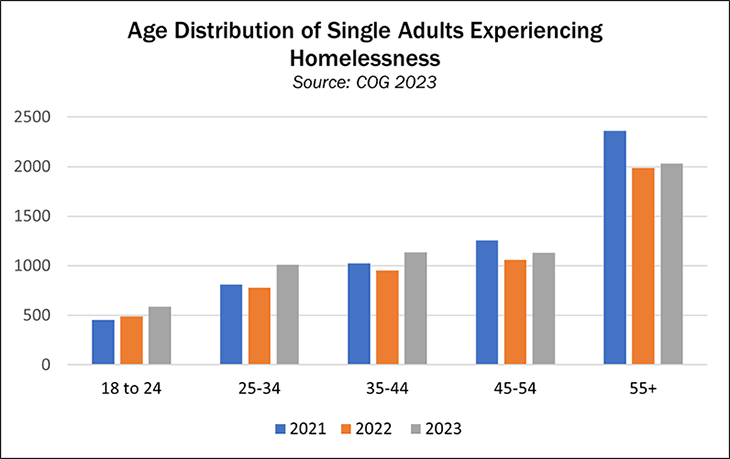Last month, The Partnership to End Homelessness hosted a special donor webinar to discuss a landmark report on chronic homelessness in DC.
The report by the DC Fiscal Policy Institute (DCFPI), “Bringing it All Home: How DC Can Become the 1st Major City to End Chronic Homelessness and Provide Higher-Quality Services” outlines a series of recommendations to DC policymakers and funders. The report also answers the ongoing question about the cost of ending chronic homelessness.
“The mission to end homelessness and create safe and affordable housing in our nation's capital for extremely low-income households has never been more important -- or more achievable,” shared The Community Foundation’s President and CEO Tonia Wellons. The Partnership to End Homelessness partnered with The William S. Abell Foundation to co-fund the report.
“[Ending chronic homelessness] is not only a moral imperative; it’s also a matter of racial justice,” DCFPI Executive Director Erica Williams shared. “Nearly 83% of individuals experiencing homelessness in the District are Black – even though Black residents make up just 44% of the District’s population and 73% of those living below the poverty line. Historic and current day racism are what got us to this result.”
The recommendations come after DCFPI hosted a series of focus groups with experts, including case managers and individuals with lived-in experience with the Permanent Supportive Housing (PSH) system. DCFPI also conducted a thorough analysis of DC homelessness data, including the annual Point in Time surveys.
DCFPI outlines Chronic Homelessness Funding into three primary categories: Tenant Vouchers & Services, Permanent Supportive Housing (PSH) or Site-Based Funding, and Stipend Incentives for Providers and Case Managers. Of the three, PSH represents the biggest need for investment.
DCFPI outlines some of the average expenses in each category.
In addition to the budgetary recommendations, the report also outlined a series of five systemic changes where public and private funding is needed. These recommendations include speeding up the PSH leasing process, strengthening case management, improving and clarifying the rules of site-based PSH, addressing behavioral health needs, preventing homelessness, and better meeting the needs of the aging population.
When asked about some of the biggest challenges, Kate Coventry, DCFPI’s Deputy Director of Legislative Strategy who authored the report, pointed to inefficiencies in the PSH system and the alarming increase in the number of seniors experiencing homelessness.
Of 1,924 PSH vouchers made available in FY22, only 427 – just 22 percent -- were used to house individuals. The delays in implementing vouchers – which originate from a number of factors, including unwieldy application requirements and case manager shortages - can sometimes prove fatal; especially for seniors experiencing homelessness. Seniors account for nearly 40 percent of the region’s single adult homeless population.
Point-in-Time Counts for the Greater Washington Region by age demographic (Credit: Metropolitan Washington Council of Governments)
“We need to figure out why older people are experiencing homelessness more – and how we can better serve them within the PSH system,” Coventry explained. “Our shelter system is not designed to meet the safety and needs of older people. That’s why we need to prioritize getting them into stable, affordable housing.”
“Homelessness is not a lake; it’s a river,” Coventry added. “People are becoming homeless and exiting homelessness all the time – as providers, our objective is to keep people moving along their housing journey, while at the same time advocating to address the challenges that brought them here in the first place.”
Coventry was joined on the webinar by Rachelle Ellison, a Senior Mentor Advisor with the People for Fairness Coalition who participated in a focus group behind the report. When asked how philanthropy should get involved, Ellison emphasized the need to continue to fund service providers and advocacy efforts -especially those that are led by people with lived experience.
“What we need are more passionate people doing this work,” added Rachelle Ellison, Senior Mentor Advisor with the People for Fairness Coalition. “We need more case managers – and we need to re-examine the requirements to become a case manager so that more people with lived experience can become involved in the work.”
“The Partnership to End Homelessness recognizes the importance of building the capacity of the PSH system and of our PSH providers,” said Silvana Straw, Senior Community Investment Officer and Philanthropic Advisor with The Partnership to End Homelessness. “Together with our donors and investors, we continue to invest in the construction of more PSH housing units, and in the capacity of PSH providers to bill Medicaid and leverage ongoing federal funding.”
“The Partnership to End Homelessness is also committed to funding our advocacy partners who are leading this work around policy and practice change,” Jennifer Olney, Senior Community Investment Officer with the Partnership to End Homelessness added. “Without the public funding that they continue to fight for, much of this work would not be possible.”
“We look forward to continuing our investment in the capacity of PSH providers and building a more just, equitable system. Together, we look forward to helping DC become the first major city to end chronic homelessness.”
For more information on how you can get involved, contact Jennifer Olney at jolney@thecommunityfoundation.org or Silvana Straw at sstraw@thecommunityfoundation.org or visit our website to learn more about The Partnership to End Homelessness.




